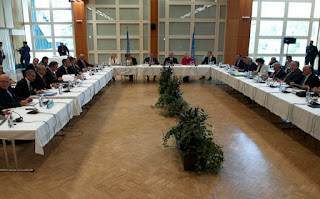The Greek Veto and the Name Issue
The NATO Summit of 2-4 April in Bucharest was in itself extraordinary in that it seemed to confirm the coming of age of Europe. In Bucharest, several European member states of NATO were able, bluntly and overtly, to obtain unanimous decisions which did not necessarily reflect the aspirations of the United States. Buoyed by the clear positions of Germany and France among others stating their opposition to granting MAP to Georgia and Ukraine, Greece was able to insist that the former Yugoslav Republic of Yugoslavia (FYROM) was not yet meriting of NATO membership as it had been acting in bad faith by not actively engaging in resolving the name issue within the framework of the UN. As a result, FYROM was seen to be faltering in the promotion of good-neighbourly relations with its neighbour and NATO member, Greece and its invitation to join NATO was put on hold pending resolution of the name issue.
Greece was certainly aided by the coming out of “Old Europe” to lucidly declare its opposition hurried decision taking which in the case of further NATO involvement in Ukraine and Georgia would have meant further antagonizing Russia. The position of many European countries that Europe (and the European Union in particular) and Russia are bound by a symbiotic relationship which includes energy imports from Russia and export of technologies, goods and services to it is diametrically in opposition with attempts to politically and militarily expand NATO into Russia near abroad.
As a consequence, Greece found solidarity among many of its partners and allies that it might not have expected. It also found itself strengthened because it too seems to be coming to terms with its role as a mid-size European state taking the lead in support of the Europeanisation of its wider neighbourhood (the countries of the Balkans and Turkey) that has the ability to stand firm in its objections to any deviations from the Alliance’s requirements regarding membership. The conclusions of the Summit now have direct implications on FYROM’s EU bid where the obligation of maintaining good-neighbourly relations with EU member states is even more clearly defined. This in turn implies that, given the fact that a decision on whether EU accession negotiations with FYROM will probably be taken at the European Council of December, the resolution the name dispute before the end of 2008 is highly probable, on the proviso that FYROM’s political leadership remains steadfast in its aspirations to join NATO and the EU.
In conclusion, one could assume that Greece was able to stand its ground because of a newfound assertiveness among key European states on the necessity of Europe to manage its affairs and insist upon the fulfillment of obligations and commitments by aspirants wishing to join the wider Euro-Atlantic community of nations. Whether this change is ephemeral or has long-term implications remains to be seen; nevertheless, this perceived Europeanisation of NATO provides Greece with the opportunity to hopefully bring the name issue to a close.
Greece was certainly aided by the coming out of “Old Europe” to lucidly declare its opposition hurried decision taking which in the case of further NATO involvement in Ukraine and Georgia would have meant further antagonizing Russia. The position of many European countries that Europe (and the European Union in particular) and Russia are bound by a symbiotic relationship which includes energy imports from Russia and export of technologies, goods and services to it is diametrically in opposition with attempts to politically and militarily expand NATO into Russia near abroad.
As a consequence, Greece found solidarity among many of its partners and allies that it might not have expected. It also found itself strengthened because it too seems to be coming to terms with its role as a mid-size European state taking the lead in support of the Europeanisation of its wider neighbourhood (the countries of the Balkans and Turkey) that has the ability to stand firm in its objections to any deviations from the Alliance’s requirements regarding membership. The conclusions of the Summit now have direct implications on FYROM’s EU bid where the obligation of maintaining good-neighbourly relations with EU member states is even more clearly defined. This in turn implies that, given the fact that a decision on whether EU accession negotiations with FYROM will probably be taken at the European Council of December, the resolution the name dispute before the end of 2008 is highly probable, on the proviso that FYROM’s political leadership remains steadfast in its aspirations to join NATO and the EU.
In conclusion, one could assume that Greece was able to stand its ground because of a newfound assertiveness among key European states on the necessity of Europe to manage its affairs and insist upon the fulfillment of obligations and commitments by aspirants wishing to join the wider Euro-Atlantic community of nations. Whether this change is ephemeral or has long-term implications remains to be seen; nevertheless, this perceived Europeanisation of NATO provides Greece with the opportunity to hopefully bring the name issue to a close.


Comments